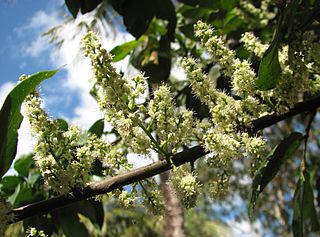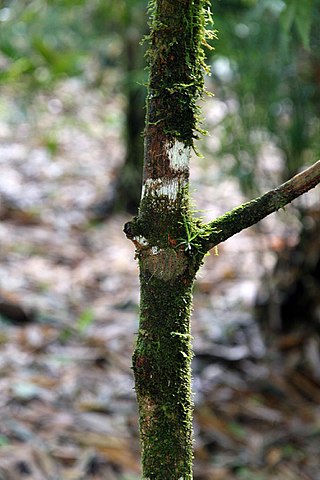
The International Union for Conservation of Nature (IUCN) Red List of Threatened Species, also known as the IUCN Red List or Red Data Book, founded in 1964, is an inventory of the global conservation status and extinction risk of biological species. A series of Regional Red Lists are produced by countries and organizations, which assess the risk of extinction to species within a political management unit.

Guioa is a genus of about 78 rainforest tree species known to science, which constitute part of the plant family Sapindaceae. They have a wide distribution, ranging from throughout Malesia, in Burma, Cambodia, Vietnam, Thailand, Malay Peninsula, Borneo, Sumatra, Philippines, Java, Flores, Timor, Sulawesi, Moluccas, New Guinea, further southwards through the east coast of Queensland and New South Wales, Australia and further eastwards to the Pacific Islands, including Tonga, New Caledonia, Fiji and Samoa.

A genet is a member of the genus Genetta, which consists of 17 species of small African carnivorans. The common genet is the only genet present in Europe and occurs in the Iberian Peninsula, Italy and France.

A species that is extinct in the wild (EW) is one that has been categorized by the International Union for Conservation of Nature as known only by living members kept in captivity or as a naturalized population outside its historic range due to massive habitat loss.
This article is a list of biological species, subspecies, and evolutionary significant units that are known to have become extinct during the Holocene, the current geologic epoch, ordered by their known or approximate date of disappearance from oldest to most recent.
Xenohyla truncata, the Izecksohn's Brazilian treefrog, is a species of frugivorous tree frog in the family Hylidae. It is endemic to the State of Rio de Janeiro, Brazil.
Erythroxylum incrassatum is a species of plant in the Erythroxylaceae family. It is endemic to Jamaica.
Erythroxylum jamaicense is a species of plant in the Erythroxylaceae family. It is endemic to Jamaica.
Erythroxylum kochummenii is a species of plant in the Erythroxylaceae family. It is a tree endemic to Peninsular Malaysia. It is threatened by habitat loss.
Erythroxylum obtusifolium is a species of plant in the Erythroxylaceae family. It is endemic to Sri Lanka.
Erythroxylum pacificum is a species of plant in the Erythroxylaceae family. It is endemic to Peru.
Erythroxylum ruizii is a species of plant in the Erythroxylaceae family. It is endemic to Ecuador. Its natural habitat is subtropical or tropical dry forests.
Erythroxylum sechellarum is a species of plant in the Erythroxylaceae family. It is endemic to Seychelles.
Erythroxylum socotranum is a species of plant. It is a part of the Erythroxylaceae family. It is endemic to Yemen. Its natural habitat is rocky areas. It is threatened by habitat loss.

Erythroxylum macrophyllum is a tropical tree in the family Erythroxylaceae. It is found in Costa Rica. It grows at altitudes of 1200–1400 m. It is a small tree of the understory reaching 2 to 6 meters. The leaves are alternate and are aligned in a plane. Small white flowers are borne March through June; they are followed by fruit that persist until September and are red when ripe.
Erythroxylum rufum, the rufous false coca, is a flowering plant species in the genus Erythroxylum.
Erythroxylum platyclados, synonyms including Erythroxylum acranthum, is a species of flowering plant in the family Erythroxylaceae, native to parts of eastern Africa and the islands of Aldabra and Comoros. It grows as a tree or shrub. It was first described by Wenceslas Bojer in 1842.





